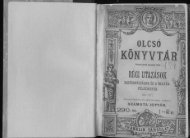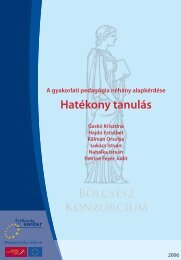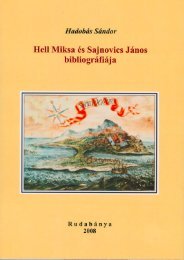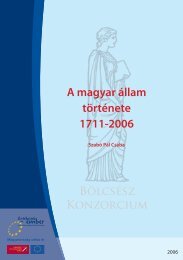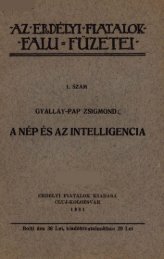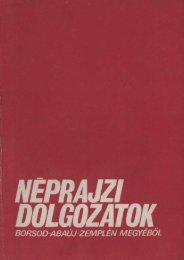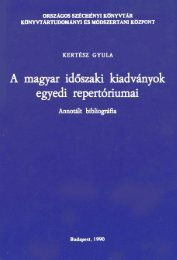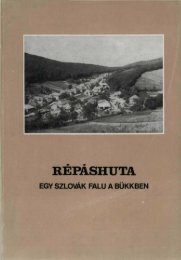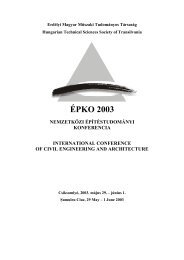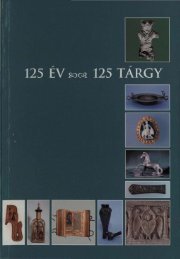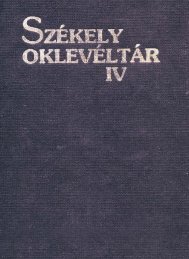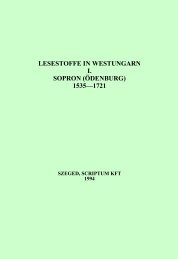- Page 3 and 4:
The publishing of this volumewas su
- Page 5:
CONTENTSZOLTÁN PÁLFYThe Dislocate
- Page 8 and 9:
INTRODUCTIONSearching for Common Gr
- Page 12 and 13:
Searching for Common Groundsautarch
- Page 14 and 15:
Searching for Common Groundsmarket
- Page 16 and 17:
Searching for Common Groundshomogen
- Page 18:
PART 1.MODERNITY AND NATIONAL IDENT
- Page 21 and 22:
MÓNIKA BAÁR[That period] became,
- Page 23 and 24:
MÓNIKA BAÁRbehaviour in 938, when
- Page 25 and 26:
MÓNIKA BAÁRevaluation of Christia
- Page 27 and 28:
MÓNIKA BAÁRthe climate theory, on
- Page 29 and 30:
MÓNIKA BAÁRthey were lacking in o
- Page 31 and 32:
MÓNIKA BAÁRresponsible for the tr
- Page 33 and 34:
MÓNIKA BAÁRThe Catholic Church di
- Page 35 and 36:
MÓNIKA BAÁRthe state and the chur
- Page 37 and 38:
MÓNIKA BAÁRWriting contemporary h
- Page 39 and 40:
MÓNIKA BAÁRstate theories in mode
- Page 41 and 42:
The Idea of the “Nation” in Tra
- Page 43 and 44:
KINGA-KORETTA SATAeverybody who is
- Page 45 and 46:
KINGA-KORETTA SATArespectively, Sá
- Page 47 and 48:
KINGA-KORETTA SATAeral, universal c
- Page 49:
KINGA-KORETTA SATAsions:” neverth
- Page 53 and 54:
KINGA-KORETTA SATAmuch quicker than
- Page 55 and 56:
KINGA-KORETTA SATASELECTED BIBLIOGR
- Page 57 and 58:
KINGA-KORETTA SATA________ . “Bes
- Page 59 and 60:
KINGA-KORETTA SATAHobsbawm, E. J. N
- Page 61 and 62:
BALÁZS TRENCSÉNYIconsidered as th
- Page 63 and 64:
BALÁZS TRENCSÉNYIclass-basis of p
- Page 65 and 66:
BALÁZS TRENCSÉNYIply happens. Thi
- Page 67 and 68:
BALÁZS TRENCSÉNYIcal - imposed on
- Page 69 and 70:
BALÁZS TRENCSÉNYIand urban life),
- Page 71 and 72:
BALÁZS TRENCSÉNYIence to historic
- Page 73 and 74:
BALÁZS TRENCSÉNYIin the long run,
- Page 75 and 76:
BALÁZS TRENCSÉNYIEastern Europe (
- Page 77 and 78:
BALÁZS TRENCSÉNYI23 Zeletin, Burg
- Page 79 and 80:
BALÁZS TRENCSÉNYIMitu, Sorin. Nat
- Page 81 and 82:
MIHÁLY SZILÁGYI-GÁLperiod. In th
- Page 83 and 84:
MIHÁLY SZILÁGYI-GÁLtoo unsystema
- Page 85 and 86:
MIHÁLY SZILÁGYI-GÁLconstitutiona
- Page 87 and 88:
MIHÁLY SZILÁGYI-GÁLlabeled as no
- Page 89 and 90:
MIHÁLY SZILÁGYI-GÁLargue that ph
- Page 91 and 92:
MIHÁLY SZILÁGYI-GÁLSELECTED BIBL
- Page 93:
RÃZVAN PÂRÂIANUThese are the gen
- Page 96 and 97:
National Prejudices, Mass Media and
- Page 98 and 99:
National Prejudices, Mass Media and
- Page 100 and 101:
National Prejudices, Mass Media and
- Page 102 and 103:
National Prejudices, Mass Media and
- Page 104 and 105:
National Prejudices, Mass Media and
- Page 106 and 107:
National Prejudices, Mass Media and
- Page 108 and 109:
National Prejudices, Mass Media and
- Page 110 and 111:
exclusion of the “national” att
- Page 112 and 113:
National Prejudices, Mass Media and
- Page 114 and 115:
National Prejudices, Mass Media and
- Page 116 and 117:
National Prejudices, Mass Media and
- Page 118 and 119:
PART 2.NATION-BUILDING AND REGIONAL
- Page 120 and 121:
“The California of the Romanians
- Page 122 and 123:
“The California of the Romanians
- Page 124 and 125:
“The California of the Romanians
- Page 126 and 127:
“The California of the Romanians
- Page 128 and 129:
“The California of the Romanians
- Page 130 and 131:
“The California of the Romanians
- Page 132 and 133:
“The California of the Romanians
- Page 134 and 135:
“The California of the Romanians
- Page 136 and 137:
“The California of the Romanians
- Page 138 and 139:
“The California of the Romanians
- Page 140 and 141:
“The California of the Romanians
- Page 142 and 143:
“The California of the Romanians
- Page 144 and 145:
“The California of the Romanians
- Page 146 and 147:
“The California of the Romanians
- Page 148 and 149:
“The California of the Romanians
- Page 150 and 151:
“The California of the Romanians
- Page 152 and 153:
Contrasting/Conflicting Identities:
- Page 154 and 155:
Contrasting/Conflicting Identitiest
- Page 156 and 157:
for individual paths of social inse
- Page 158 and 159:
Contrasting/Conflicting Identitieso
- Page 160 and 161:
contributed to their isolation. Und
- Page 162 and 163:
Contrasting/Conflicting Identitiese
- Page 164 and 165:
Contrasting/Conflicting Identitiest
- Page 166 and 167:
Contrasting/Conflicting Identities7
- Page 168 and 169:
Contrasting/Conflicting Identities1
- Page 170 and 171:
Contrasting/Conflicting Identitiesr
- Page 172 and 173:
Contrasting/Conflicting Identities6
- Page 174 and 175:
Contrasting/Conflicting Identitiess
- Page 176 and 177:
Contrasting/Conflicting IdentitiesS
- Page 178 and 179:
The Dislocated Transylvanian Hungar
- Page 180 and 181: The Dislocated Transylvanian Hungar
- Page 182 and 183: The Dislocated Transylvanian Hungar
- Page 184 and 185: The Dislocated Transylvanian Hungar
- Page 186 and 187: The Dislocated Transylvanian Hungar
- Page 188 and 189: The Dislocated Transylvanian Hungar
- Page 190 and 191: The Dislocated Transylvanian Hungar
- Page 192 and 193: The Dislocated Transylvanian Hungar
- Page 194 and 195: The Dislocated Transylvanian Hungar
- Page 196 and 197: Transylvania Revisited: Public Disc
- Page 198 and 199: Transylvania RevisitedTransylvania
- Page 200 and 201: Transylvania Revisitedidentities -
- Page 202 and 203: schauung, would never accept a civi
- Page 204 and 205: Transylvania RevisitedRomanian nati
- Page 206 and 207: PART 3.NATIONALIZING MAJORITIESAND
- Page 208 and 209: The Idea of Independent RomanianNat
- Page 210 and 211: The Idea of Independent Romanian Na
- Page 212 and 213: The Idea of Independent Romanian Na
- Page 214 and 215: The Idea of Independent Romanian Na
- Page 216 and 217: The Idea of Independent Romanian Na
- Page 219 and 220: BARNA ÁBRAHÁMthe banks. Petru Suc
- Page 221 and 222: BARNA ÁBRAHÁM33 “We could all s
- Page 223 and 224: BARNA ÁBRAHÁMsecondary schools, a
- Page 225 and 226: BARNA ÁBRAHÁMPãcalã, Viktor.
- Page 227 and 228: IRINA CULICtions. 6 Nations are ine
- Page 229: IRINA CULICThe most powerful concep
- Page 233 and 234: IRINA CULICTable 3 suggests that ab
- Page 235 and 236: IRINA CULICfrom Hungarians who desc
- Page 237 and 238: IRINA CULICTABLE 8. The definition
- Page 239 and 240: IRINA CULICNotably, this is how the
- Page 241 and 242: IRINA CULICIn fact, the only chance
- Page 243 and 244: IRINA CULICtrolling Reproduction in
- Page 245 and 246: IRINA CULIC36 Culic, “Between Civ
- Page 247 and 248: IRINA CULICKymlicka, Will. Multicul
- Page 249 and 250: ZOLTÁN KÁNTORthat the ethnocultur
- Page 251 and 252: ZOLTÁN KÁNTORIn order to understa
- Page 253 and 254: ZOLTÁN KÁNTORthe related mechanis
- Page 255 and 256: ZOLTÁN KÁNTORThe concept of natio
- Page 257 and 258: ZOLTÁN KÁNTORpates in elections,
- Page 259 and 260: ZOLTÁN KÁNTORalso by the Hungaria
- Page 261 and 262: ZOLTÁN KÁNTORthe EU at a consider
- Page 263 and 264: ZOLTÁN KÁNTORwhile being able to
- Page 265 and 266: ZOLTÁN KÁNTORis considered to be
- Page 267 and 268: ZOLTÁN KÁNTORprocedure of issuing
- Page 269 and 270: ZOLTÁN KÁNTORFurthermore, I have
- Page 271 and 272: ZOLTÁN KÁNTOR27 The debate on thi
- Page 273 and 274: ZOLTÁN KÁNTORNairn, Tom. Faces of
- Page 275 and 276: DRAGOº PETRESCU1. Ethnic nationali
- Page 277 and 278: DRAGOº PETRESCUminorities’ strat
- Page 279 and 280: DRAGOº PETRESCUFurthermore, as Wal
- Page 281 and 282:
DRAGOº PETRESCUwhile in 1938/1939
- Page 283 and 284:
DRAGOº PETRESCUnationalists went f
- Page 285 and 286:
DRAGOº PETRESCUHungarians towards
- Page 287 and 288:
DRAGOº PETRESCUFurthermore, Ceauº
- Page 289 and 290:
DRAGOº PETRESCUto fragile economic
- Page 291 and 292:
DRAGOº PETRESCUalism still exists.
- Page 293 and 294:
DRAGOº PETRESCUOrigin and Spread o
- Page 295 and 296:
DRAGOº PETRESCU1989-94 (Boulder: S
- Page 297 and 298:
DRAGOº PETRESCU64 For more on the
- Page 299 and 300:
DRAGOº PETRESCU________ . A Bias f
- Page 301 and 302:
AFTERWORDMore Than Just Neighbors:
- Page 303 and 304:
AFTERWORDproud to have happened to
- Page 305 and 306:
AFTERWORDdiscourse in historical st
- Page 307 and 308:
p. 308page empty
- Page 309 and 310:
SELECTED BIBLIOGRAPHY 1990-2000coun
- Page 311 and 312:
SELECTED BIBLIOGRAPHY 1990-2000on t
- Page 313 and 314:
SELECTED BIBLIOGRAPHY 1990-2000ever
- Page 315 and 316:
SELECTED BIBLIOGRAPHY 1990-2000ARTI
- Page 317 and 318:
SELECTED BIBLIOGRAPHY 1990-2000Dan,
- Page 319 and 320:
SELECTED BIBLIOGRAPHY 1990-2000Pipp
- Page 321 and 322:
SELECTED BIBLIOGRAPHY 1990-2000ARTI
- Page 323 and 324:
SELECTED BIBLIOGRAPHY 1990-2000Iord
- Page 325 and 326:
SELECTED BIBLIOGRAPHY 1990-2000Voge
- Page 327 and 328:
SELECTED BIBLIOGRAPHY 1990-2000Beri
- Page 329 and 330:
SELECTED BIBLIOGRAPHY 1990-2000Beke
- Page 331 and 332:
SELECTED BIBLIOGRAPHY 1990-2000Egye
- Page 333 and 334:
SELECTED BIBLIOGRAPHY 1990-2000Ande
- Page 335 and 336:
SELECTED BIBLIOGRAPHY 1990-2000ty a
- Page 337 and 338:
SELECTED BIBLIOGRAPHY 1990-2000Boic
- Page 339 and 340:
SELECTED BIBLIOGRAPHY 1990-2000Jak
- Page 341 and 342:
SELECTED BIBLIOGRAPHY 1990-2000Benk
- Page 343 and 344:
SELECTED BIBLIOGRAPHY 1990-2000Fodo
- Page 345 and 346:
SELECTED BIBLIOGRAPHY 1990-2000Nán
- Page 347 and 348:
SELECTED BIBLIOGRAPHY 1990-2000of H
- Page 349 and 350:
SELECTED BIBLIOGRAPHY 1990-2000ARTI
- Page 351 and 352:
SELECTED BIBLIOGRAPHY 1990-2000ARTI
- Page 353 and 354:
SELECTED BIBLIOGRAPHY 1990-2000Mari
- Page 355 and 356:
SELECTED BIBLIOGRAPHY 1990-2000Mari
- Page 357 and 358:
SELECTED BIBLIOGRAPHY 1990-2000Lipc
- Page 359 and 360:
SELECTED BIBLIOGRAPHY 1990-2000Gaá
- Page 361 and 362:
SELECTED BIBLIOGRAPHY 1990-2000Tibo
- Page 363 and 364:
SELECTED BIBLIOGRAPHY 1990-2000Oni
- Page 365 and 366:
SELECTED BIBLIOGRAPHY 1990-2000In H
- Page 367 and 368:
SELECTED BIBLIOGRAPHY 1990-2000Beke
- Page 369 and 370:
SELECTED BIBLIOGRAPHY 1990-2000Lipc
- Page 371 and 372:
SELECTED BIBLIOGRAPHY 1990-2000Vinc
- Page 373 and 374:
NOTES ON AUTHORSNÁNDOR BÁRDI (b.
- Page 375 and 376:
NOTES ON AUTHORSRÃZVAN PÂRÂIANU
- Page 377 and 378:
NOTES ON AUTHORSMARIUS TURDA (b. 19
- Page 379 and 380:
Map 1. Hungary and Romania, up to W
- Page 381 and 382:
CIVIC EDUCATION PROJECTThe Civic Ed
- Page 383 and 384:
Printed by PrinterArt Kkt.Hungary,



